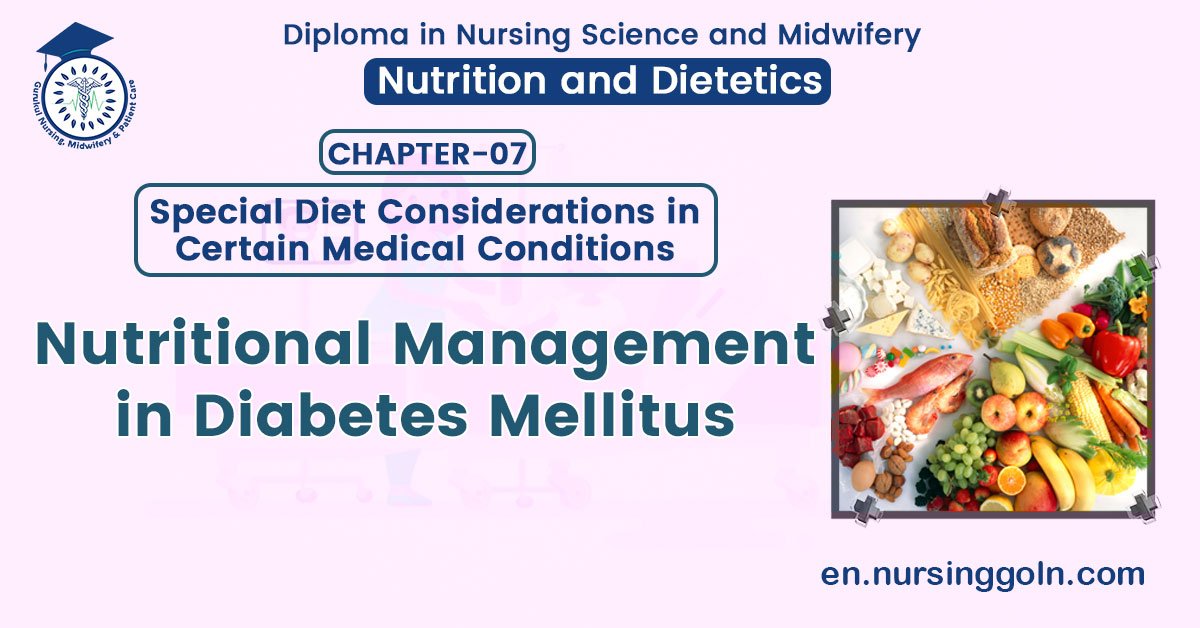Nutritional Management in Diabetes Mellitus – This book covers the entire syllabus of “Nutrition and Dietetics” prescribed by BNMC for all Diploma in Nursing Science and Midwifery students. We tried to accommodate the latest information and topics. This book is an examination-friendly setup according to the teachers’ lectures and examination questions.
At the end of the book previous university questions are given. We hope in touch with the book students’ knowledge will be upgraded and flourish. The unique way of presentation may make your reading of the book a pleasurable experience.

Nutritional Management in Diabetes Mellitus
Diabetes Mellitus:
It is a clinical syndrome characterized by hyperglycemia due to absolute or relative deficiency of insulin.
| OTHER DEFINITIONS-NICE TO KNOW Diabetes mellitus may be defined as a state of chronic hyperglycemia which may result from environmental and genetic factors, most often acting together.
Diabetes mellitus is a disorder of glucose intolerance due to deficiency in insulin production and it’s action leading to hyperglycemia and abnormalities in carbohydrate, protein and fat metabolism
|
Clinical Features of Diabetes Mellitus:
1. Polyuria.
2. Polydipsia (Excessive thirst).
3. Polyphagia (Excessive hunger); predilection for sweet foods.
4. Nocturia.
5. Weight loss.
6. Tiredness, fatigue, lethargy.
7. Weakness.
8. Blurring of vision.
9. Frequent superficial infections (vaginitis, fungal skin infections).
10. Slow healing of skin lesions after minor trauma.
11. Mood change, irritability, difficulty in concentrating, apathy
Objectives of Dietary Management In Diabetes:
1. Optimum nutrition.
2. Desirable body weight.
3. Keeping blood sugar levels normal or near normal.
4. Keeping blood fat low to prevent heart disease.
5. Keeping low level of sugar and ketones in the urine.
Dietary Management of DM:
Aim of diet therapy:
- Attain and maintain ideal body weight.
- Maintain blood glucose level as near as possible.
- Achieve or delay the onset of complication.
Dietary composition:
1. Carbohydrate: 45-60%
2. Fat <35%
3. Protein: 10-15%
4. Diabetic food and sweeteners:
- Low-calorie and sugar-free drinks and sorbitol containing foods.
5. Salt:
- Reduce sodium intake to no more than 6 g daily.
- Further restriction of sodium intake (to less than 3 g daily) is important in treating hypertensive diabetic patients.
Weight management:
- In addition to reducing calorie intake, overweight patients should be strongly encouraged to take regular exercise, in the form of walking, swimming or cycling, for approximately 30 minutes daily
Alcohol:
- Alcohol can be consumed in moderation unless there is a coexisting medical problem that requires abstinence.
(Ref: Onila Salin’s Essential nutrition/1″/157)
Definition of Health:
The World Health Organization (WHO) defined health has been used, unchanged, since 1948: “Health is a state of complete physical, mental and social well-being and not merely the absence of disease or infirmity, so that each citizen can lead a socially and economically productive life”.
Guide Lines for Good Health:
1. Awareness of health care.
2. Prevention of disease.
3. Adequate knowledge of health facilities.
4. Lot of knowledge of medical education.
5. Appropriately known of disease control.
6. Helps to provide-promote health.
Deficiency Disease:
When a diseased caused by the lack of nutrition then it is called deficiency disease of this nutrients. The common nutrition related deficiency diseases in Bangladesh are:
- Protein energy malnutrition (PEM).
- Low birth weight baby.
- Nutritional anaemia.
- Nutritional blindness.
- Iodine deficiency disorder.
- Rickets.
- Lathyrism.
- Scurvey

Excess and deficiency disease of NaCl or salt
Excess of salt /NaCl cause:
1. High blood pressure.
2. Heart disease.
3. Kidney failure.
Salt deficiency causes:
- Muscular cramps.
- Dryness of mouth.
- Mental apathy.
Daily requirement of salt is 4 grams. But most people take upto 15 grams a day. It is dangerous for our body.
